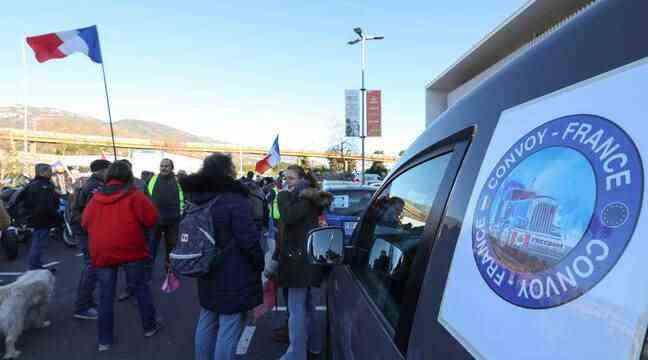The appointment has been set. The participants in the French “freedom convoy” have begun their long journey to Paris where they are to meet on Friday evening. Leaving from Bayonne, Nice or even Strasbourg, they plan to demonstrate in the capital on Saturday in order to protest against the vaccination pass and the health restrictions adopted by the government as part of the fight against the coronavirus epidemic.
The contours of their plan are becoming more and more clear on the networks… except that the government has decided otherwise. The Paris police headquarters issued a decree on Thursday prohibiting the holding of the demonstration because of “the risks of disturbances to public order that this gathering could cause”. Ditto in Brussels where the mayor of the Belgian capital has banned access to the Belgian capital while the demonstrators would not have, according to him, asked for any authorization. In Paris, the decree promises, among other things, up to several thousand euros in fines for the organizer of a prohibited event. 20 minutes takes stock of the risks run by the demonstrators.
What risk do pedestrian participants in the “freedom convoy” risk?
The decree recalls that the organizer of a prohibited demonstration may be punished by six months’ imprisonment and a fine of 7,500 euros. A sentence which for the time being is unlikely to be applied to anyone since, as with the gatherings of “yellow vests”, the protest movement inspired by that in Canada was born on social networks and does not strictly speaking count. of identified organizers. All persons identified as present at the prohibited assembly still expose themselves to a fourth class fine, continues the decree. A fine in the amount of 135 euros.
Convoys of vehicles in Paris: the Prefect of Police issues a prohibition order.
Check out our press release 👇 pic.twitter.com/8Jq1r2SIYj— Prefecture of Police (@prefpolice) February 10, 2022
What are the risks for the participants in the vehicle?
The difference with the prohibited demonstrations of the “yellow vests” is that this time, the protagonists of the movement came with their car and for some, their work tool: heavy goods vehicles. Motorized vehicles that may well disrupt traffic. The police headquarters therefore drew the Highway Code which stipulates that “obstructing or obstructing a road open to traffic” can be punished by two years’ imprisonment, a fine of 4,500 euros and the impoundment of the vehicle. The driver can also lose up to six points on his license and see it suspended for up to three years.
Can protesters escape these sanctions?
Regarding the 135 euros for participation in a prohibited event, lawyer Eric de Caumont recalls that like any verbalization, “we are not obliged to accept the fine and we can contest it”. It will then be up to the court to decide whether or not to prosecute. Regarding the lawsuits for “obstructing traffic”, there again, there is a way to challenge, advances the lawyer specializing in the defense of the rights of motorists: “If it is a snail operation, it slows down, but it does not block and therefore it probably does not fit within the framework indicated by the prefecture. »
Eric de Caumont recalls that the right to demonstrate is a fundamental right “including by blocking”. If the roadblocks of demonstrators are defensible in the eyes of the law, they must nevertheless remain “filtering for the emergency services”, continues the expert. Indeed, the owner of a vehicle whose blockage would have contributed to the aggravation of the state of health of a person transported by ambulance, runs the risk of being sued.

